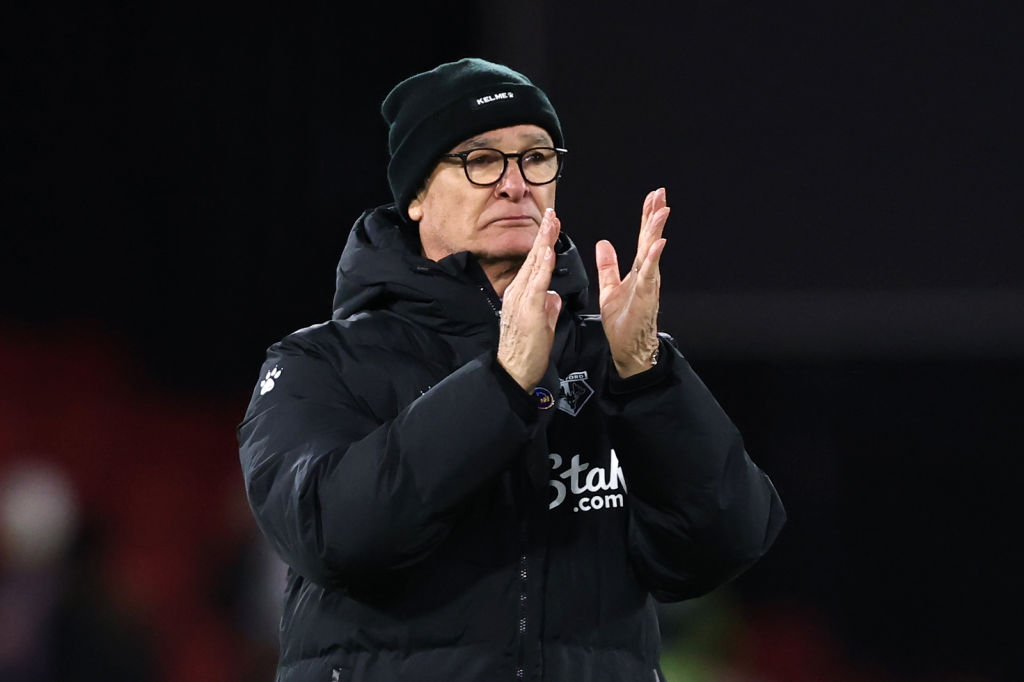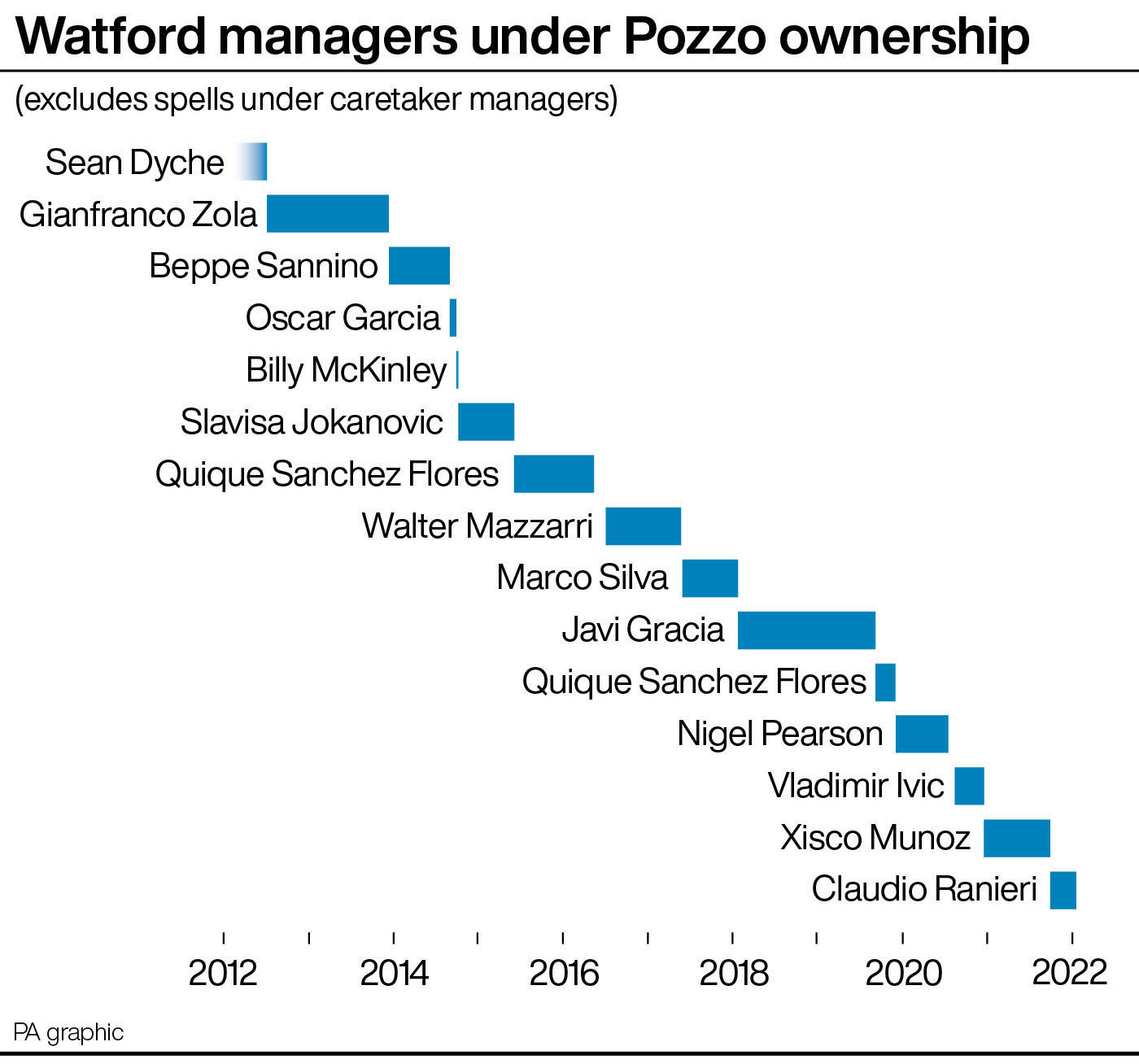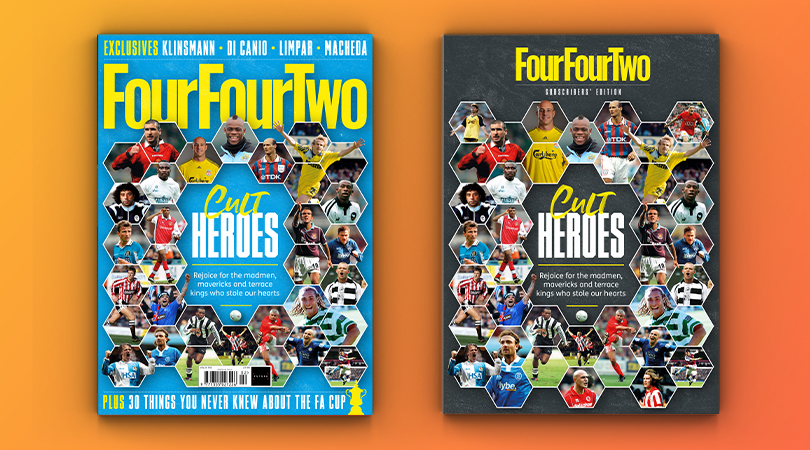Why are Watford so bad at hiring managers?
Clearly, the Watford owners think their managers should be doing better – so is there any end to this endless cycle of sackings or does the Hornets' strategy actually make sense in a modern world?

Watford are extremely good at signing players and extremely bad at hiring managers. Or so they may believe, anyway.
They would not admit to the latter, even though they have had more head coaches under the ownership of the Pozzos than West Ham have had in their history. But there can be the subtext to the sackings: the players are good enough, let down only by the managers.
“The board feels recent performances strongly indicate a negative trend at a time when team cohesion should be visibly improving,” declared a club statement when Xisco Munoz was dismissed. Claudio Ranieri’s firing was accompanied by a reference to a “talented squad”.
But it is invariably the inference: every manager should be doing better. They are all underachieving with the players they didn’t sign. It is why they are fired after 12 or 14 games (in the cases of Ranieri and Quique Sanchez Flores, the second time around) or 22 (both Vladimir Ivic and Nigel Pearson) or 36 (both Munoz and Slavisa Jokanovic) or one season (Sanchez Flores, in his first spell, and Walter Mazzarri).
Perhaps it shows a lack of self-awareness, unless the same people who appoint a manager and dismiss them months later are privately accepting they got it wrong. Certainly, and in Watford’s defence, it can reflect the high-stakes environment of a yo-yo club. Both promotion to the Premier League and staying in it are worth are fortune and a quick fix can have an immediate impact.
It is now uncontroversial to say Watford were right to axe Ivic, as results in the Championship improved under Munoz: they won nine of 20 league games under the Serb, who left them in fifth, and 18 of the next 26 under the Spaniard to surge to second. Beat the drop and the verdict will be that sacking Ranieri salvaged another season.
And yet if a recurring theme is a ruthless willingness to upgrade if a superior option becomes available, there are times when there must be a tacit admission that they displayed poor judgment in making the initial appointment. If one theory is that few managers rarely actually fail at Watford, in part because they are not there long enough to, both Ranieri and Sanchez Flores, when he returned, did.
Get FourFourTwo Newsletter
The best features, fun and footballing quizzes, straight to your inbox every week.

But a belief that they should always be doing better suggests the Pozzos overrate their own acquisitions.
They cited “team cohesion” when axing Munoz without acknowledging that it is harder to generate any with a revolving door of managers and players. There have been 16 signings since the end of last season, and Emmanuel Dennis has been a revelation, but it is notable the often diplomatic Ranieri said that he believed Watford could be “saved” with “new” players; not merely the existing ones.
It is hard to ascertain precisely how good Watford’s squad is, given the wholesale importing of players, some of low profile, a few who sound like Championship Manager regens and one or two of whom may never have actually existed.
But Watford have acquired the most potent attack among the four teams in most danger of relegation. In Ismaila Sarr, Josh King and Dennis, augmented by Joao Pedro and Cucho Hernandez, there is more firepower than their peers enjoy. The counter-argument is that their recruitment policy has left them with a wretched defence. Ranieri can be criticised for not bringing solidity but the fact is that Watford’s last top-flight clean sheet was in February 2020. Some of their defending, whether from an over-the-hill Danny Rose or an error-prone William Troost-Ekong, has been hapless. A unit has looked too disjointed to compensate for individual shortcomings. Among their fellow stragglers, Burnley, with the chemistry and cohesion that comes with continuity, have a more reliable rearguard in the trio of Nick Pope, Ben Mee and James Tarkowski.
Watford’s next game, a trip to Turf Moor, can be framed as consistency versus change, especially as Sean Dyche was the first manager the Pozzos sacked. Despite or because of that, their idiosyncratic model has brought the second most successful spell in Watford’s history.
They were promoted in 2015 and relegated in 2020, each alongside Bournemouth – but the Cherries had a solitary manager in five years in the Premier League to the Hornets’ six. That indicates that neither approach is intrinsically superior, even if most of us instinctively prefer one based on loyalty and long-termism.
But if understanding with team-mates and affinity with the club help players to perform to their potential, perhaps it is no surprise that Watford think their teams are less than the sum of their parts. It is the inevitable consequence of a hire-and-fire policy.
And if managers are not blameless for that, more of the fault must lie with the owners.
Subscribe to FourFourTwo today and get three issues for £3.
Restock your kit bag with the best deals for footballers on Amazon right now
ALSO READ
RANKED The 20 worst Premier League teams ever – by points total
RANKED The 8 lowest-scoring Premier League teams EVER
LIST 100 incredible football facts to make your own pub quiz questions
Richard Jolly also writes for the National, the Guardian, the Observer, the Straits Times, the Independent, Sporting Life, Football 365 and the Blizzard. He has written for the FourFourTwo website since 2018 and for the magazine in the 1990s and the 2020s, but not in between. He has covered 1500+ games and remembers a disturbing number of the 0-0 draws.


